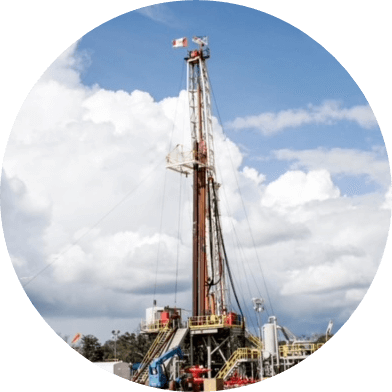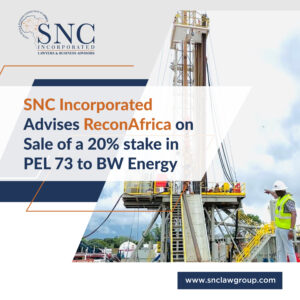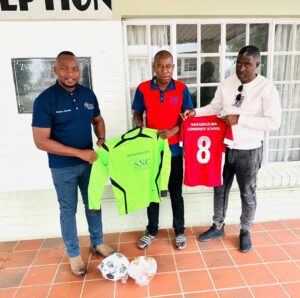Namibia: Trends & Developments
Shakwa Nyambe and Shafimana Shimakeleni SNC Incorporated
Trends and Developments
Contributed by:
Shakwa Nyambe and Shafimana Shimakeleni
SNC Incorporated see p.6
The Republic of Namibia, also known as the “Land of the Brave”, is a largely unexplored frontier that has recently attracted interest from major and medium-sized oil companies. To date, 24 exploration and appraisal wells have been drilled off Namibia, 18 of which are exploration wells and six of which are appraisal wells within the Kudu Gas Field. Onshore activities have been gathering steady pace in recent months, with Reconnaissance Energy Africa (ReconAfrica) drilling two stratigraphic wells, the first in the first quarter of 2021 and the second in the second quarter of 2021.
Onshore Exploration – ReconAfrica Reconnaissance Energy Namibia (Pty) Ltd, a wholly-owned subsidiary of ReconAfrica was issued with Petroleum Exploration Licence No 73 in 2014 to undertake exploration activities. ReconAfrica owns 90% interest in the licence while the National Petroleum Corporation of Namibia (NAMCOR) holds the remaining 10%.
Since no drilling activities have ever taken place on the shores of the Kavango basin, ReconAfrica launched a tri-stratigraphic well-drilling campaign to try to fully understand the basin and determine whether there is an active petroleum system.
On 15 April 2021, ReconAfrica and the Ministry of Mines and Energy released a joint statement regarding the first stratigraphic test well (6-2). The results of the first well supported an active petroleum system with multiple source intervals. The second stratigraphic test well (6-1) is designed to be drilled to a depth of 3,800 m (12,500 ft). The drilling of the second well was completed on 14 July 2021 and the well is now
undergoing wireline logging. Early results for the first section of the second well (6-1) provide further confirmation of a working petroleum system.
Now that evidence of an active petroleum system has been found, ReconAfrica and NAMCOR will conduct an initial 450 km low-impact 2D seismic acquisition programme, for which they have hired Polaris Seismic International.
The Namibian government has taken note of the progress made by ReconAfrica and has directed the Ministry of Mines and Energy to develop an efficient and effective public relations strategy with a communication plan for stakeholder engagement on the project, including constituency councillors, traditional leaders, and local communities in the Kavango East, West, and Zambezi regions.
Kudu Gas Field
The only commercial discovery in Namibia is the Kudu Gas Field, which was discovered in 1974 by a joint venture, comprising Chevron Oil, Regent Petroleum and SOEKOR (Pty) Ltd. It lies approximately 170 km west of Oranjemund, in offshore Namibia, at a water depth of 170 m. The field’s proven natural gas reserves are estimated at 1.3 trillion cubic feet and its possible reserves at nine trillion cubic feet. The upstream partners in the Kudu Gas Field, Block 2814A are the National Petroleum Corporation of Namibia (NAMCOR) with 95% and BW Offshore with 5% as the operator. The initial development plan for the field was a gas-to-power project, with Namibia Power Corporation (NAMPOWER) as the downstream partner. The gas produced from the Kudu Gas Field was to be transported
through a 170 km pipeline to a power station, which was planned to be built approximately 25 km north of Oranjemund in the southern part of Namibia. However, the initial development plan failed, due to the non-fulfilment of some conditions in the Project Development Plan (PDA) signed by the upstream partners and the downstream partner. In terms of the project schedule set out in the annexures of said PDA, the government of the Republic of Namibia was supposed to provide the required project support, including economic stabilisation provisions and financial guarantees.
However, in November 2018 and January 2019, the government of the republic made it clear that it was not going to provide the required support in terms of the PDA. As a result, the downstream partner, NAMPOWER, indicated that it would withdraw from the PDA and not continue to be part of the Kudu Gas Project. This means that the upstream partners will have to come up with another development plan that does not require any support from the government of Namibia. It is believed that the upstream partners are currently engaged in working out a new development plan for the project.
Walvis Bay Oil Storage Facility
In 2015 the government of the Republic of Namibia commissioned the construction of national oil storage facilities and a maritime platform for oil offloading at the port of Walvis Bay, Namibia. The oil storage facility consists of off-shore and onshore operations, a 6.5 km pipeline and a tank farm. Fuel and oil will be transported from tanker ships to the storage tanks via the pipeline. Once completed, the facility will have a total capacity of 75 million litres and will be able to store various grades of diesel, as well as unleaded petrol, heavy fuel oil and aviation fuel. Upon completion, the oil storage capacity of the country will be increased from 14 days to about
30 days. The construction of the facility is currently 99% complete.
In October 2018, the Namibian cabinet gave NAMCOR approval to be the operator of the facility (offloading facility, pipeline and tank farm) on behalf of the government of Namibia, while the Namibia Ports Authority (NAMPORT) was authorised to be the operator of the offshore marine elements of the facility. The Namibian cabinet directed the Ministry of Mines and Energy, Namibia to enter into agreements with NAMCOR and NAMPORT to regulate the operations and sharing of the facility.
NAMCOR was recently appointed by the government of Namibia to manage and operate the new state-of-the-art storage facility. The storage facility consists of a newly built tanker jetty that can accommodate vessels with up to 60,000 DWT. The facility has three diesel tanks, one with a capacity of five million litres and two with a capacity of 20 million litres, two ten million-litre tanks for unleaded petrol, one five million-litre tank for heavy fuel oil and one five million-litre tank for jet A1. The newly constructed jetty allows vessels to offload products for shore tanks, or load products for export onto the vessels.
The storage facility will not only be used for NAMCOR’s own trading purposes but also to host other international oil marketing companies such as Vitol, Gunvor, Vivo and Total, to ensure that it is utilised optimally and that Namibia becomes a strategic gateway through which neighbouring African countries are supplied.
Intended Reforms to the Petroleum Legal Regime
In 2017, the Ministry of Mines and Energy, Namibia commenced an exercise to reform Namibia’s downstream and upstream petroleum legal framework through the Commonwealth
Secretariat’s Oceans and Natural Resources Advisory Division (ONR), with the assistance of some private consultants.
Upstream legal framework
The Petroleum (Exploration & Production) Act of 1991 will be amended to consolidate all current amendments into a single document. The Petroleum Taxation Act of 1991 will also be amended. There are intended amendments to the Petroleum Regulations, and additional draft subsidiary legislation to be prescribed under the Petroleum (Exploration & Production) Act of 1991 is being prepared. The current Model Petroleum Agreement implemented in 2007 will also be amended, and a local content legal framework is being mooted. The intended reform will also look at clarification of the regime for the governance of environmental matters for petroleum operations and the possible preparation of draft subsidiary environmental legislation for the upstream sector. The pertinent intended amendments include the following:
- a review of current annual charges for explo- ration and production licences to track an inflationary measure;
- drafting and finalisation of the Local Content Policy and Regulations;
- a review of the current royalty rate to make it more consistent with other frontier petroleum jurisdictions;
- a review of the current formula for Additional Profit Tax;
- the rate of Petroleum Income Tax is to be prescribed in regulations rather than within the main body of the Petroleum Taxation Act of 1991;
- the details regarding state participation in petroleum operations are to be enhanced;
- a review of the provisions on decommission- ing;
- a provision for unitisation and cross-border co-operation; and
- clarification of the ownership of petroleum data and information obtained from licence areas.
Downstream legal framework
The Petroleum Products and Energy Act of 1990 will be amended to consolidate all current amendments into a single document. The Petroleum Products Regulations will also be amended, and existing amendments will be consolidated.
The Ministry of Mines and Energy, Namibia has already consulted the petroleum industry regarding the intended reforms. Both the upstream and downstream stakeholders/industry players have submitted their input for consideration. The intended reforms to the petroleum legal regime are expected to be completed in the second half of 2021.
Major Oil Companies Flocking to Namibia Namibia’s geology is said to be similar to Brazil’s offshore pre-salt, while the onshore is similar to the massive South African Karoo Basin. Cou- pled with its stable fiscal and legal regime, this has resulted in a number of major oil companies acquiring acreage in Namibia over the past two years. In 2019, ExxonMobil expanded its exploration acreage in Namibia by adding another seven million net acres (28,000 sq km) to its offshore holdings, with water depths reaching 4,000 m, following the signing of an agreement between the government of Namibia and NAM- COR for blocks 1710 and 1810, and farm-in agreements with NAMCOR for blocks 1711 and 1811A. ExxonMobil is the operator of blocks 1710 and 1810 and holds an 85% interest, while NAMCOR holds a 10% interest, with the remaining 5% interest being held by a local Namibian company. ExxonMobil is also the operator of blocks 1711 and 1811A, and holds an 85% interest, while NAMCOR holds the remaining 15% interest. ExxonMobil also holds a 40% interest in
blocks 2112B and 2212A off Namibia, comprising about 2.8 million gross acres (11,500 sq km).
In 2017, Total farmed into block 2913B off Namibia and became the operator. Total also acquired and became the operator of block 2912 in 2018.
Shell operates blocks 2913A and 2914B off Namibia and has advanced plans to drill. Qatar Petroleum has also farmed in blocks 2913B and 2912, both of which are operated by Total.
Qatar Petroleum recently concluded a farm-out agreement with Shell where Qatar Petroleum will hold a 45% participating interest in PEL 39 pertaining to blocks 2913A and 2914B, while Shell will hold a 45% interest, and NAMCOR will hold the remaining 10% interest.
With most major oil companies have acquired acreage in Namibia, it appears it is just a matter of time before a big oil discovery is made.
Upcoming Wells to Be Drilled in Namibia
Total is expected to drill a well in Namibia’s Block 2913B. Total is the operator of the petroleum block, with a 40% interest; the other joint venture partners are Qatar Petroleum with a 30% interest, Impact Oil and Gas Limited with a 20% interest and NAMCOR with a 10% interest. Drill- ing is expected in the fourth quarter of 2021 or the first quarter of 2022.
ReconAfrica is also expected to drill a third stratigraphic well in the Kavango Basin during the third quarter of 2021. However, at the time of writing, this had not yet been confirmed. Lastly, French-based oil and gas company Maurel & Prom and its joint venture partners are expected to drill Namibia’s blocks 2212B, 2313 and 2413B in the fourth quarter of 2021 or the first quarter of 2022. Maurel & Prom is the operator of the block and has an 85% interest; the other joint venture partners are NAMCOR with an 8% interest, Livingstone Mining Resource Development with a 4% interest and Frontier Mineral Resources with a 3% interest.
These are indeed exciting times for Namibia’s oil and gas industry, with more activities expected next year when the price of oil has stabilised.
SNC Incorporated is a full-service energy, natural resources, commercial and dispute resolution law firm with offices in Windhoek. Equipped with international exposure and local knowledge of the laws in Namibia, southern Africa, and the rest of Africa, it is uniquely placed to advise international corporations, private companies, governments, indigenous African companies, state-owned enterprises and non-government organisations doing business in Namibia and the rest of Africa. SNC Incorporated’s comprehensive experience as a firm, combined with the proven skills of its lawyers and consultants
in key sectors, help it provide valuable legal and business advisory to its clients. It also provides legal services in infrastructure, telecommunications, environment and climate change, legal and regulatory compliance, mergers and acquisitions, and labour and employment. The firm aims to help companies doing business in Africa to grow, transform and excel, and it strives to provide clients with practical solutions to the legal and regulatory challenges facing their businesses while maintaining the highest quality possible and surpassing client expectations in providing value for money.
AUTHORS:

Shakwa Nyambe is the founder and managing partner of SNC Incorporated. He is a specialist in energy, natural resources and commercial lawyer and is an expert in drafting, reviewing and
negotiating contracts. He has advised international corporations, state-owned enterprises, governments and individuals in energy, natural resources, commercial and dispute resolution matters. He has provided legal and business advisory services to foreign investors in various matters ranging from M&A, commercial transactions and corporate governance, to project financing. His clients include oil and gas companies; renewable energy companies; mining, construction and infrastructure companies; state-owned enterprises, governments and corporate entities. Shakwa is the current director of the African Chapter of the Association of International Petroleum Negotiators (AIPN) and serves on the drafting committees of the AIPN JOA Committee, LNG, SPA Committee, the Asset Sale and Purchase Agreement Committee, and the Drilling Contract Committee.

Shafimana Shimakeleni is an associate at SNC Incorporated who specialises in oil and gas, administrative law, drafting of commercial agreements (and the negotiation thereof), as well as drafting pleadings.
Shimakeleni also focuses on defence litigation. Having been exposed to the legal fraternity at an international level, Shimakeleni has insight into how the various legal frameworks operate at both a global and local level. He has a master’s degree in oil and gas law with professional skills from the University of Aberdeen, and he has a particular interest in downstream energy law, focusing on the regulation of electricity and gas networks and the liberalisation of energy markets in developing economies. He is admitted to practice in the High Court of Namibia and was recently seconded to the Ministry of Mines and Energy, the directorate dealing with regulation, compliance and economics for petroleum affairs, to gain further exposure in this sector.




